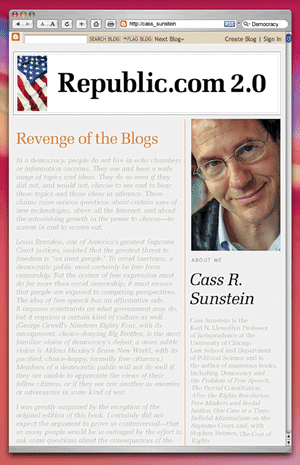Book Review: Republic.com 2.0

After the book Republic.com (2001), law professor Cass Sunstein now provides us with an updated version by the name of Republic.com 2.0.
As we look at the table of contents, not much seems to be changed except for the inclusion of two new chapters: Blogs (chapter 8) and Republic.com (chapter 10).
The back flap of Republic.com 2.0 states that with this book ‘Sunstein thoroughly rethinks the critical relationship between democracy and the Internet in a world where partisan Web logs have emerged as significant forces in politics and where cyber-jihadists have embraced the Internet to thwart democracy and spread violence’.
Sunstein does this primarily by focusing on fragmentation and (group) polarization on the Internet. He gives the example of ‘The Daily Me’, a futuristic vision where people are able to create and customize their own newspapers and magazines – and more importantly, where they can choose their own content. As Sunstein vividly illustrates:
‘You need not come across topics and views that you have not sought out. Without any difficulty, you are able to see exactly what you want to see, no more and no less. You can easily find out what “people like you” tend to like and dislike. You avoid what they dislike. You take a close look at what they like.’
He talks about ‘filtering’ the intake of content. And stresses that this utopian vision in fact poses a real threat to democracy, where people show no interest in other topics or opinions and shield themselves off from opposing views.
Group polarization can even lead to extremism and violence, for it is easier for like-minded people to only communicate with one another – and thereby likely to shift to more extreme points of view.
Republic.com 2.0 also discusses government regulation on the Internet and says that we need it, because without it the Internet is likely to fall prey to invaders and cyberterrorists. As he writes: ‘The owners of websites, no less than the owners of everything else, benefit by government regulation; and without it, they would not really be owners at all’.
Sunstein has written Republic.com 2.0 in a clear way, that is easy to read. He has a tendency of repeating a lot of his views and illustrations, which really isn’t necessary and makes for a tiresome and aggravating read every now and again. That said, this book raises interesting and illuminating ideas and questions on how we behave on the Internet and what possible consequences this may have.
Sunstein, Cass R. Republic.com 2.0. Princeton, PA: Princeton University Press, 2007.